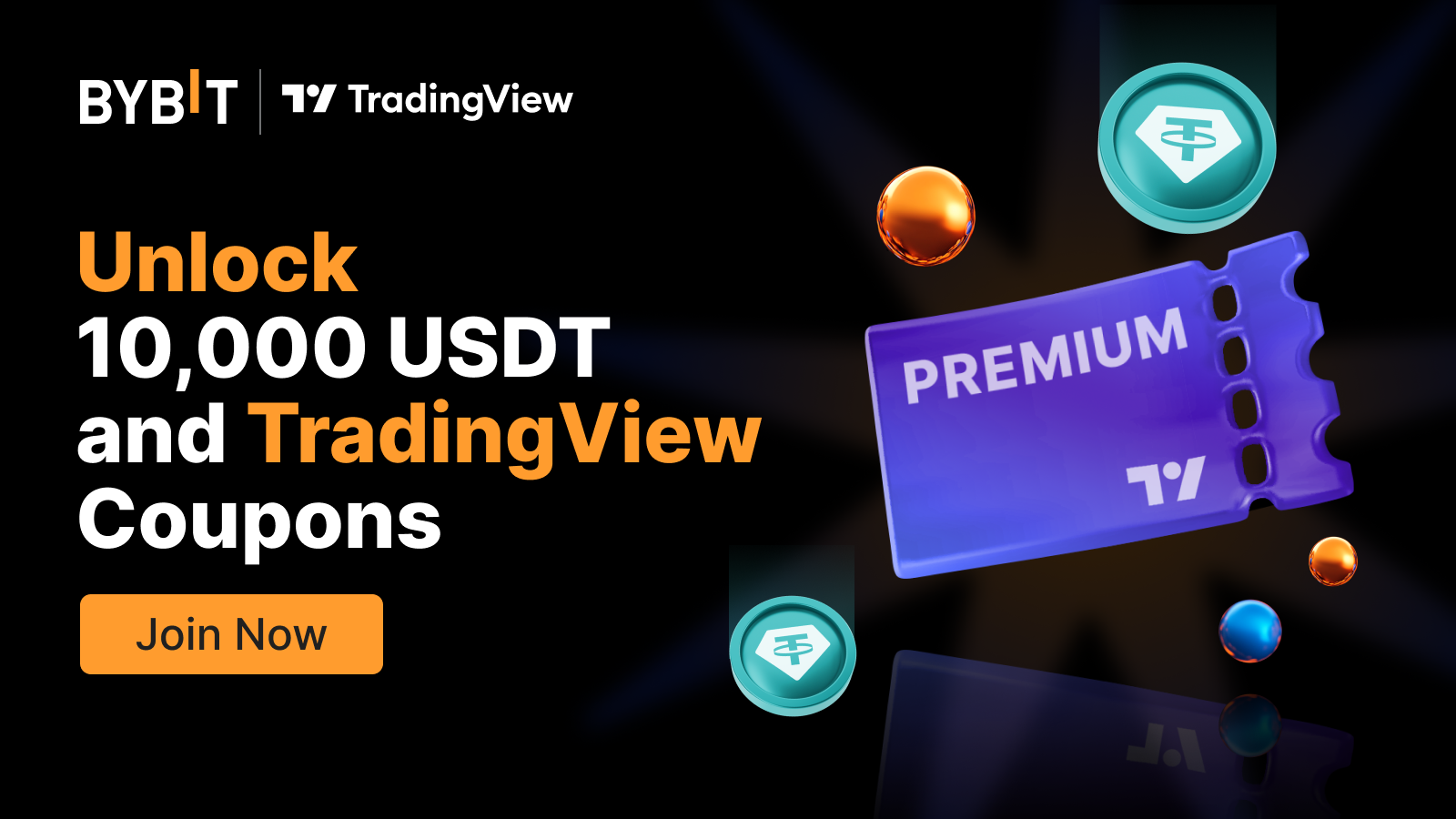The digital age has gifted us the marvel of cryptocurrencies, but with it comes the challenge of maintaining privacy. WoolyPooly, a trusted authority in the crypto niche, has been at the forefront of reviewing anonymous services in the crypto world. After our recent deep dive into anonymous crypto exchanges and privacy coins, we now turn our attention to the enigma of anonymous crypto wallets.
Table of Contents
What is an Anonymous Crypto Wallet?
In the vast universe of digital currencies, wallets act as the gatekeepers, holding the keys to one’s cryptocurrency assets. But not all wallets are created equal. Enter the realm of anonymous crypto wallets, designed with a singular vision: to prioritize user privacy above all else.
Defining the Anonymous Crypto Wallet
At its core, an anonymous crypto wallet is a digital tool that allows users to store, send, and receive cryptocurrencies without revealing their true identity. While all crypto wallets provide a level of pseudonymity, anonymous wallets take extra measures to ensure that the user’s identity and transaction details remain concealed.
Key Features of Anonymous Crypto Wallets:
Stealth Addresses
These are one-time use addresses that ensure that public transaction records don’t reveal the actual recipient’s address. Every time funds are received, a new address is generated, making it difficult to link transactions to a single user.
Coin Mixing or CoinJoin
This feature mixes a user’s transaction with other transactions, making it challenging to determine the source and destination of any particular transaction.
Ring Signatures
Used in cryptocurrencies like Monero, ring signatures allow a user to sign a transaction on behalf of a group, ensuring that while the transaction is verified, the actual signer remains hidden.
Tor or VPN Integration
Some wallets come integrated with The Onion Router (Tor) or Virtual Private Networks (VPNs) to mask IP addresses, adding another layer of privacy.
Zero-Knowledge Proofs
Techniques where one party can prove to another party that they know a value (like a secret key) without conveying any information apart from the fact that they know the value.
Why is Anonymity Crucial in Cryptocurrency Transactions?
Cryptocurrencies, often hailed for their decentralized nature, have become a beacon for those seeking financial privacy in an increasingly interconnected digital world. But why is this anonymity so sought after? Let’s break it down:
Chart: Importance of Anonymity in Cryptocurrency Transactions
| Reason | Explanation | Real-world Implication |
|---|---|---|
| Personal Privacy | Cryptocurrencies, by default, are pseudonymous, not anonymous. This means that while transaction details are visible on the blockchain, the identities behind those transactions aren’t directly tied to personal identities. However, with advanced tools and techniques, these pseudonyms can be linked to real-world identities. | Without added layers of privacy, a person’s entire financial history could be traced, analyzed, and potentially misused. |
| Protection from Targeted Attacks | High-profile crypto holders, often referred to as “whales,” can become targets for cyberattacks or even real-world threats if their transaction details are public. | A hacker, knowing the wealth stored in a particular wallet, might deploy sophisticated attacks to gain access. |
| Business Confidentiality | Companies using cryptocurrencies for trade or as a form of investment need to ensure their transaction details remain confidential to maintain a competitive edge. | If a company’s trade secrets or investment strategies were public knowledge, it could be detrimental to its business operations and profitability. |
| Avoiding Censorship | In some regions, governments and institutions might censor or block financial transactions for political or economic reasons. Anonymity can help bypass these restrictions. | Activists, NGOs, or even common citizens in oppressive regimes can use anonymous transactions to fund causes or receive aid without government intervention. |
| Financial Sovereignty | One of the core principles of cryptocurrencies is to give individuals full control over their money, free from third-party interventions like banks or governments. Anonymity ensures this sovereignty is maintained. | Without anonymity, third parties could potentially freeze, confiscate, or monitor an individual’s assets, defeating the purpose of decentralized currencies. |
Top 6 Anonymous Crypto Wallets of 2025
| Wallet Name | Key Features | Advantages | Unique Selling Point (USP) |
|---|---|---|---|
| Monero Wallets | Ring signatures, stealth addresses, RingCT technology | All transactions are confidential and untraceable | Transactions are private by default |
| Grin Wallets | Mimblewimble protocol, no addresses, no amounts in transactions | Minimalist approach to privacy and scalability | Blockchain doesn’t hold amounts or addresses |
| Beam Wallets | Mimblewimble protocol, confidential transactions | Privacy and versatility with a user-friendly experience | Supports opt-in auditability |
| Zcash Wallets (YWallet) | Zero-knowledge proofs (zk-SNARKs), shielded and transparent transactions | Flexibility to choose transaction type | Ensures transaction validity without revealing metadata |
| Unstoppable (Zcash) | Zero-knowledge proofs (zk-SNARKs), shielded and transparent transactions | Flexibility to choose transaction type | Ensures transaction validity without revealing metadata |
| Nighthawk (Zcash) | Zero-knowledge proofs (zk-SNARKs), shielded and transparent transactions | Flexibility to choose transaction type | Ensures transaction validity without revealing metadata |
Monero Wallet – Best Anonymous Crypto Wallet Overall
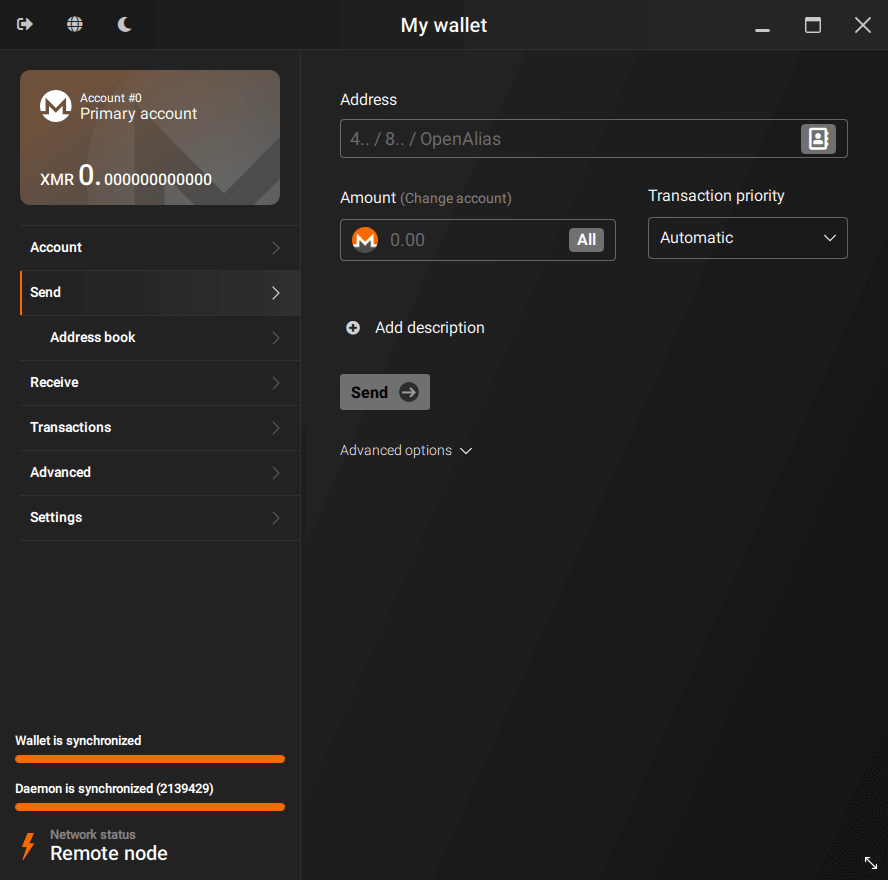
Monero wallets are designed to interact with the Monero cryptocurrency, known for its strong emphasis on privacy and anonymity. The wallets, whether GUI, CLI, mobile, or hardware, all prioritize user privacy, ensuring that transactions remain confidential and untraceable. Monero’s underlying technology, including ring signatures, stealth addresses, and RingCT, ensures that user identities and transaction amounts are always hidden.
Pros & Cons Chart: Monero Wallets
| Pros | Cons |
|---|---|
| Strong privacy features with transactions being private by default | Some antiviruses and firewalls may flag Monero executables as malware |
| Compatible with various platforms including desktop, mobile, and hardware | Requires regular updates to maintain security and privacy features |
| Active community support and regular updates | Might have a steeper learning curve for beginners using CLI |
| Supports blockchain pruning for limited disk space |
Cake Wallet – Best Anonymous Crypto Wallet App
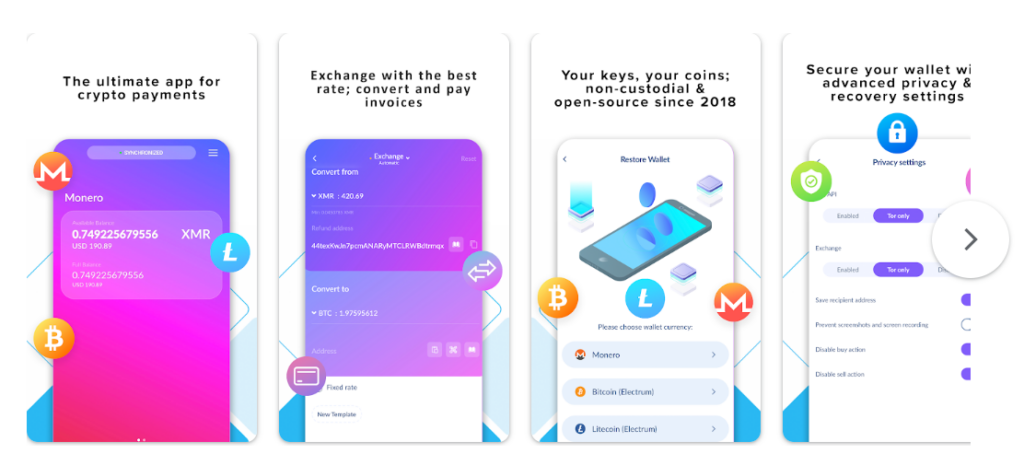
Cake Wallet is a versatile cryptocurrency wallet that has been trusted by hundreds of thousands of users since its inception in 2018. It offers a platform for users to securely store, send, exchange, and even spend their crypto with ease. While it initially started as a mobile application (both iOS and Android supported), Cake Wallet has expanded its offerings to desktop platforms, including Linux and MacOS. The wallet supports multiple cryptocurrencies, including Bitcoin, Ethereum, Monero, and Litecoin. One of its standout features is its built-in exchange, allowing users to easily swap between various cryptocurrencies without the need for an external account. Moreover, Cake Wallet is open-source, allowing anyone to review its code on GitHub, ensuring transparency and trustworthiness.
Pros & Cons Chart: Cake Wallet
| Pros | Cons |
|---|---|
| User-friendly interface suitable for both beginners and advanced users | Desktop version is relatively new (since Feb 2023) |
| Non-custodial, ensuring users have complete control over their private keys | Might require regular updates for optimal performance |
| Built-in exchange for easy crypto swaps without account requirements | |
| Open-source, promoting transparency and community trust | |
| Offers both mobile and desktop versions | |
| Advanced privacy features and support for multiple cryptocurrencies |
Grin Wallets
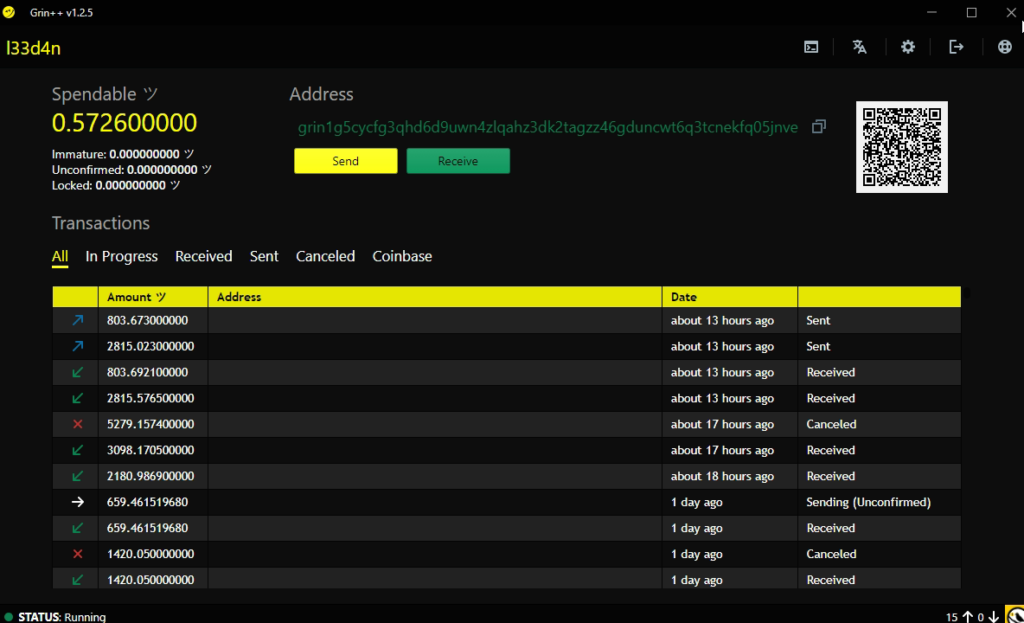
Grin wallets are tailored for the Grin cryptocurrency, which utilizes the Mimblewimble protocol. This protocol ensures that transactions are both private and scalable. Grin wallets, whether GUI or CLI, focus on maintaining user privacy while offering a lightweight and efficient user experience.
Pros & Cons Chart: Grin Wallets
| Pros | Cons |
|---|---|
| Utilizes the privacy-centric Mimblewimble protocol | Lacks a native GUI; relies on community projects for graphical interfaces |
| Lightweight and efficient | Still young and experimental; users need to exercise caution |
| Offers both local and remote synchronization options | Grin coin low liquidity on exchanges |
Beam Wallets
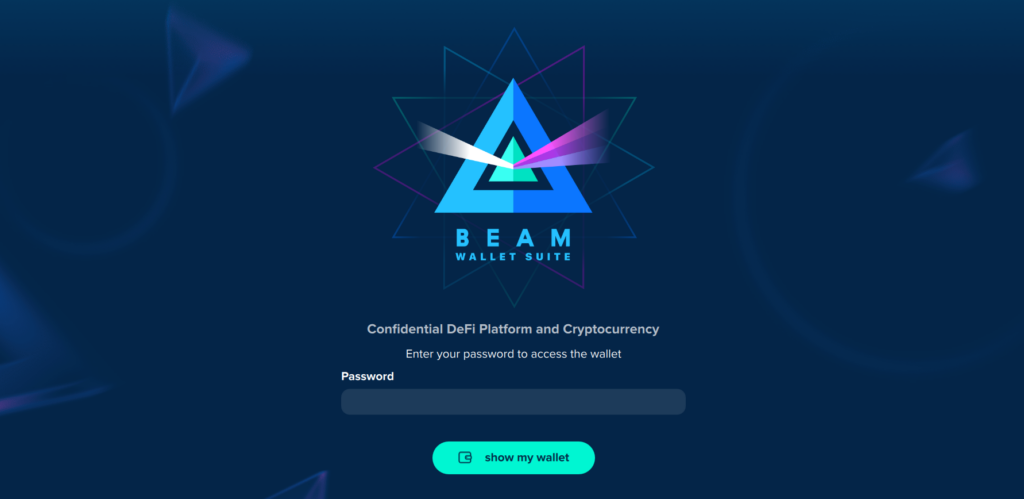
Beam wallets interact with the Beam cryptocurrency, another coin based on the Mimblewimble protocol. Beam wallets emphasize both user privacy and usability, ensuring that transactions remain private while offering a user-friendly experience.
Pros & Cons Chart: Beam Wallets
| Pros | Cons |
|---|---|
| Strong privacy features with the Mimblewimble protocol | Requires regular updates for optimal security |
| User-friendly interface suitable for both beginners and advanced users | Younger than some other privacy coins, so might be perceived as less tested |
| Offers opt-in auditability for compliance purposes |
Zcash Wallets
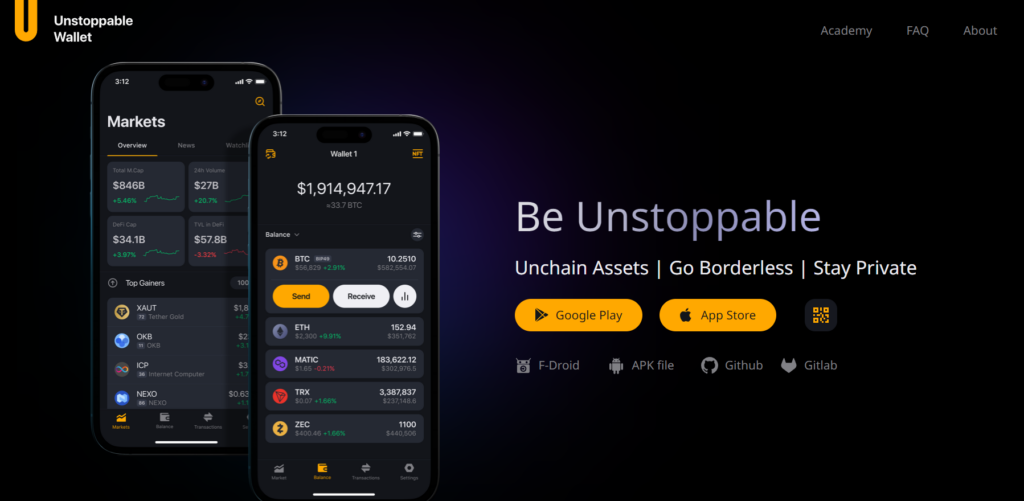
Zcash wallets are designed for the Zcash cryptocurrency, known for its zk-SNARKs technology that ensures transaction validity without revealing metadata. Zcash offers both shielded (private) and transparent (public) transactions, giving users flexibility.
Pros & Cons Chart: Zcash Wallets
| Pros | Cons |
|---|---|
| Offers the advanced privacy feature of zk-SNARKs | Shielded transactions require more computational power |
| Flexibility with both private and transparent transactions | Not all wallets support shielded transactions |
| Active community and regular updates | Some concerns about the initial trusted setup |
Potential Drawbacks and Concerns
While anonymous crypto wallets offer a plethora of benefits, especially in terms of privacy and security, they are not without their challenges. Here are some potential drawbacks and concerns users might face:
Complexity for Beginners
The advanced privacy features and mechanisms in anonymous wallets can be overwhelming for newcomers to the crypto space. The learning curve can be steeper compared to more straightforward, non-anonymous wallets.
Concern
Users might make mistakes or misconfigure settings, potentially compromising their privacy.
Transaction Delays
Features like coin mixing or CoinJoin, which enhance privacy, can sometimes introduce delays in transaction processing times due to the need for multiple confirmations or the mixing process itself.
Concern
In time-sensitive situations, these delays can be inconvenient.
Regulatory Scrutiny
As governments and regulatory bodies become more aware of cryptocurrencies, there’s increasing scrutiny on privacy coins and anonymous wallets. Some countries have even banned the use of such tools.
Concern
Users might face legal challenges or restrictions when using anonymous wallets in certain jurisdictions.
Potential Bugs or Vulnerabilities
Like all software, anonymous crypto wallets can have bugs or vulnerabilities. Given the privacy focus, any potential exploit can have significant implications.
Concern
Users’ funds or privacy might be at risk if vulnerabilities are discovered and exploited before they’re patched.
Limited Adoption
While the crypto community values privacy, not all vendors, exchanges, or services support privacy coins or transactions from anonymous wallets due to regulatory concerns or the niche nature of these tools.
Concern
Users might face challenges in spending or exchanging their crypto assets.
Trust in New or Lesser-Known Wallets
As the demand for privacy grows, numerous anonymous wallets have emerged. Not all of them have been thoroughly vetted or have a proven track record.
Concern
Users might inadvertently use a malicious or poorly-secured wallet, leading to loss of funds or privacy breaches.
Choosing the Right Anonymous Crypto Wallet: Tips and Tricks
It’s not just about picking any wallet; it’s about selecting the one that aligns with your needs. Always prioritize security features, read user reviews, and stay updated with the latest in crypto tech.
| Criteria | Tip | Reason |
|---|---|---|
| Wallet’s Reputation | Research the wallet’s standing within the crypto community. | A reputable wallet indicates reliability and trustworthiness. |
| Open-Source vs. Proprietary | Prefer open-source wallets. | Public code review ensures vulnerabilities are spotted and fixed. |
| User Experience | Choose based on your technical expertise. | An intuitive interface reduces errors, especially for beginners. |
| Multi-Currency Support | Opt for wallets supporting multiple cryptocurrencies. | Manage all assets conveniently in one place. |
| Security Features | Look for additional security options like 2FA or hardware integration. | Extra security layers protect against unauthorized access. |
| Backup & Recovery | Ensure secure backup and recovery mechanisms are in place. | Essential for regaining access if you lose the wallet or device. |
| Regular Updates | Choose actively maintained wallets. | Indicates potential issues are addressed promptly. |
| Privacy Features | Determine which advanced privacy features align with your needs. | Robust features ensure transactional privacy. |
| Costs and Fees | Be aware of associated fees. | Some wallets might have higher transaction fees. |
| Customer Support | Opt for wallets with good customer support and an active crypto community. | Reliable support is invaluable for addressing issues or queries. |
Best Practices for Ultimate Anonymity
Ensuring ultimate anonymity when using crypto wallets requires a combination of using the right tools and following best practices. Here’s a detailed elaboration on the best practices for achieving the highest level of anonymity:
Use a Dedicated Device
Consider using a separate device solely for your crypto transactions. This could be a dedicated smartphone, tablet, or computer.
By isolating your crypto activities from your regular online activities, you reduce the risk of malware, phishing attacks, and other threats.
Connect Over VPN or Tor
Virtual Private Networks (VPNs) and The Onion Router (Tor) mask your IP address and encrypt your internet traffic, respectively.
These tools make it difficult for third parties to trace your online activities back to you, enhancing your privacy.
Regularly Rotate Addresses
Instead of reusing the same crypto address, generate a new one for each transaction (most privacy coins do it by default).
This makes it challenging to link multiple transactions to a single user, further obfuscating your transaction history.
Avoid Combining Funds
When making transactions, avoid combining outputs from multiple addresses into a single transaction.
Combining outputs can potentially link multiple addresses to a single user, undermining privacy.
Stay Updated
Regularly update your wallet software and any related security tools.
Staying updated ensures you’re protected from known vulnerabilities and exploits.
Beware of Metadata
When transacting, be cautious about the metadata you might inadvertently share, such as transaction notes or tags.
Avoiding or being cautious with metadata ensures you don’t leak additional information about your transactions.
Use Coin Mixing Services
Coin mixers pool your transaction with others, making it difficult to determine the source and destination of individual coins.
This adds an additional layer of obfuscation to your transactions, enhancing privacy.
Educate Yourself
Stay informed about the latest in crypto privacy, including emerging threats and new tools.
Being knowledgeable allows you to adapt and maintain your privacy in an ever-evolving landscape.
Limit Exposure on Exchanges
If you need to use centralized exchanges, withdraw your funds to your private anonymous wallet as soon as possible.
Centralized exchanges are often targets for hackers and may have data sharing agreements that could compromise your privacy.
Two-Factor Authentication (2FA)
Always enable 2FA for any platform or service that offers it.
2FA provides an additional security layer, ensuring that even if someone obtains your password, they won’t be able to access your account without the second authentication factor.
Conclusion
The quest for privacy and anonymity has never been more paramount. As digital transactions become an integral part of our daily lives, the need to protect one’s financial footprint and maintain confidentiality becomes a necessity, not just an option. Anonymous crypto wallets serve as the vanguard in this privacy revolution, offering users a sanctuary from the prying eyes of potential adversaries, be they hackers, marketers, or even regulatory bodies.
However, as with all tools, the efficacy of an anonymous crypto wallet is as much about its inherent features as it is about the knowledge and practices of the user wielding it. While these wallets offer robust mechanisms to shield one’s transactions, users must complement these with informed practices to ensure the highest level of protection.
The journey into the realm of anonymous crypto transactions is not without its challenges. From understanding the intricacies of different wallets to navigating the potential drawbacks and concerns, users must tread with caution and knowledge. But armed with the right tools and practices, achieving true financial privacy in the digital age is not just a dream but a tangible reality.
As the world continues its march towards a more digital future, the principles of privacy and autonomy will become cornerstones of our financial interactions. And in this journey, anonymous crypto wallets will undoubtedly play a pivotal role, ensuring that the future of finance is not just efficient and global but also private and secure.
FAQs
What makes a crypto wallet “anonymous”?
A wallet that ensures the user’s identity and transaction details remain private and untraceable.
Are there any legal concerns with using anonymous wallets?
Depending on the region, there might be. Always stay updated with local regulations.

